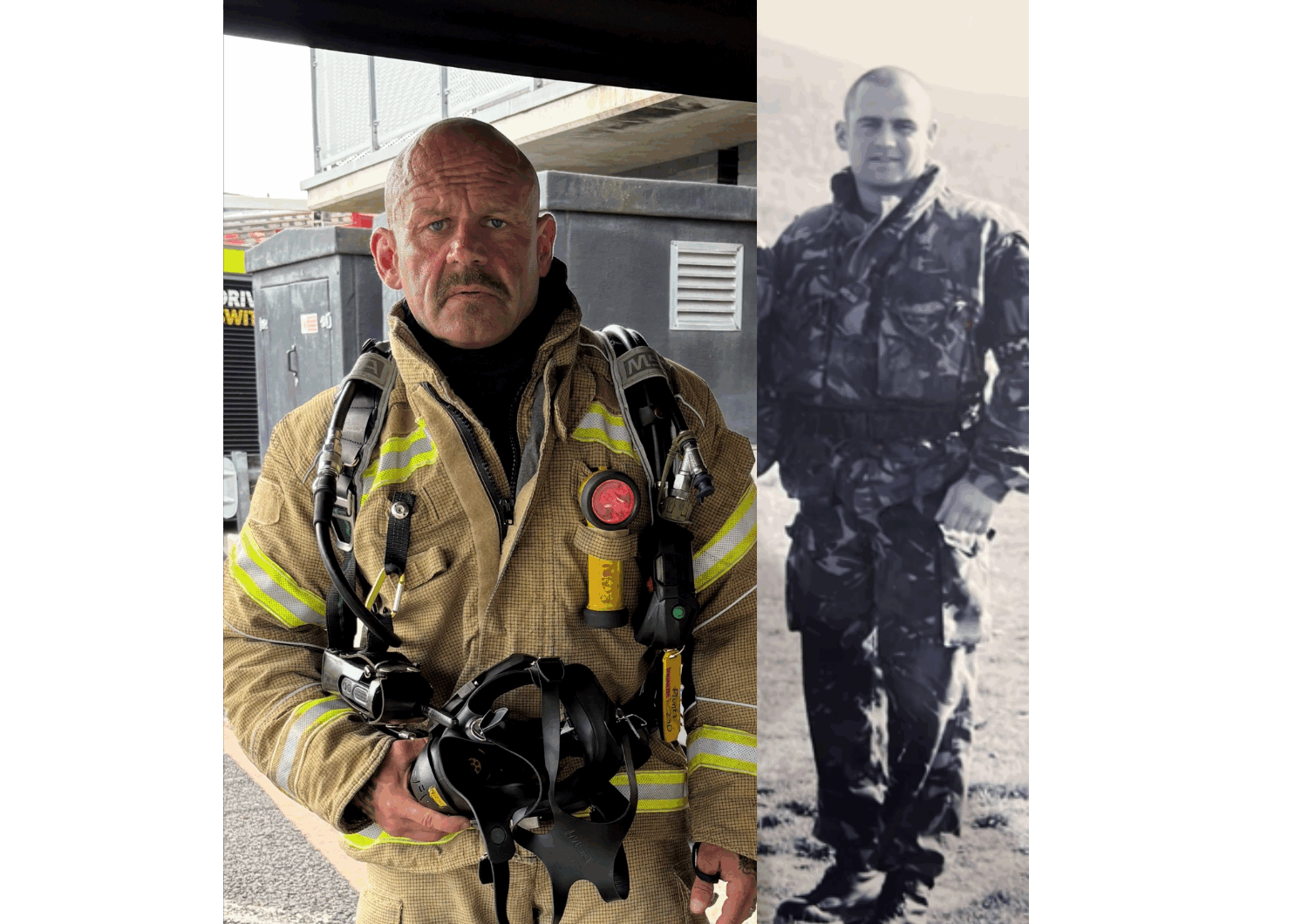
As a Royal Marine serving in areas of intense conflict, Steve Plunkett saw human suffering that has had a profound impact on his life.
Over the years, he used alcohol when he experienced episodes of flashbacks and overwhelming feelings of guilt and self-hatred.
Steve, who never drank alcohol outside of this episodes, described it as a self-harming mechanism.
He would then throw himself back into work and exercise – he represented Britain in international powerlifting championships – until the next trigger.
Concerned about his health and the impact on his family, Steve sought help, first from military charities and then from Op COURAGE, a specialist mental health service for military veterans.
Steve, who lives in St Albans, Hertfordshire, has shared his story for Armed Forces Week (23 to 29 June) to highlight the importance of talking about mental health, and the support he has received from Op COURAGE.
Essex Partnership University NHS Foundation Trust is one of the lead partners which provides the specialist mental health service for military veterans in the east of England.
Steve, 52, had grown up in the military. He had been a Royal Marines cadet, had lived near the main training base in Devon, and his father is a retired Marine who was awarded the MBE.
He joined the Royal Marines as a teenager and served between 1993 and 2005, completing tours of duty in countries including Northern Ireland and Kosovo.
In Kosovo he was part of a multi-national peace-keeping corps, working alongside civilian policemen in a military policeman role.
Keeping people safe in a country devastated by conflict was difficult and complex. In the aftermath of war, people were living with the horrors of death, poverty, disease, violence and crime.
Steve, who left the Marines as a Junior Non-Commissioned Officer, said: “It was a more than tough job for the soldiers but for me, I was thrust into a responsibility that I probably wasn’t trained for to be honest.
“Even though I had travelled the world, I had lived quite a sheltered life in some ways. Dealing with the crime, the rapes, and the prostitution – it was unbelievable.
“You watch the news now and we’re probably more aware of world atrocities than we were then.
“It was a long deployment and I think there were probably a number of reasons I was suffering for so many years afterwards. But my flashbacks and guilt and feeling of hatred towards myself were caused by things I saw there.”
Steve was diagnosed with post-traumatic stress disorder (PTSD) but he didn’t feel his experiences were serious in comparison to his friends who had lost limbs or their lives in Afghanistan and Iraq.
He also felt there was a stigma around PTSD in the early 2000s, which made him wary of speaking to his colleagues in case they would not want to work alongside him.
He turned to alcohol when he was triggered to numb the pain, sometimes spending “48 hours drinking alcohol in silence, just crying.”
Steve said he tried “every type of therapy,” before contacting Op COURAGE.
Op COURAGE is an NHS community mental health service that supplements existing NHS mental health services. All the staff either have a military background, or experience of working with people in the armed forces.
Steve said he valued talking to staff who understood the military way of life but were independent of the military, because he felt he needed that external perspective.
He said: “The moment I rang Op COURAGE, a penny dropped when the first thing the person I spoke to said ‘what’s your service number mate?’
“I had had four or five days of no sleep, no food, and it clicked that I have someone on the other end of the phone who understands.
“That was over a year ago and I’ve not experienced a triggering episode since.”
Steve underwent EMDR therapy (Eye Movement Desensitisation and Reprocessing), a form of psychotherapy.
He said: “The treatment was physically tough, I found it really mentally and physically draining but well worth it.
“After my first session I slept for two days solid. I hadn’t slept for four hours at a time for 20 years.”
Steve, who works for a company that provides training for the London Fire Brigade, said the treatment has given him his life back.
He said: “It’s changed my outlook on life, it’s given me a second chance at life. I know for a fact there are a lot of guys punishing themselves, feeling their trauma isn’t ‘bad enough’.
“But it’s subjective to each individual and I think it’s a shame that people can access help from Op COURAGE but they’re not always aware of it.
“I can’t speak highly enough of Op COURAGE. If anyone is in two minds about taking that step to therapy, it’s not easy but it can be so rewarding.
“I live each day of my life knowing if there is an issue, it’s not something I can ignore or pretend it didn’t happen, but I have been furnished with the right skills to be able to deal with it.”
- Op COURAGE has experts working in psychiatry, psychology, occupational therapy, mental health nursing, as well as employment specialists and support workers.
EPUT delivers the East of England service alongside Norfolk and Suffolk NHS Foundation Trust, St Andrew’s Healthcare, Mental Health Matters, and the military charities The Warrior Programme and Walking With The Wounded.
They provide care for veterans and their families in Norfolk, Suffolk, Essex, Hertfordshire, Bedfordshire, Cambridgeshire and Milton Keynes.
For more information visit the Op COURAGE page.